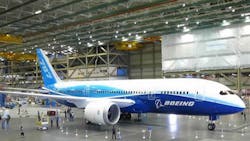Boeing Raises Forecast for Airliner Demand by $500 Billion
Boeing Co. raised its 20-year forecast for global demand for airliners by $500 billion on Tuesday.
Chicago-based Boeing (IW 500/16) said it now sees the global market doubling to 34,000 airliners worth $4,500 billion, from the 33,500 aircraft worth $4,000 billion that it had forecast last year.
"The world's aviation market is broader, deeper and more diverse than we've ever seen it," said Randy Tinseth, vice president of marketing at Boeing Commercial Airplanes.
"It has proven to be resilient even during some very challenging years and is driving production-rate increases across the board," he added in a statement.
Boeing based its forecast on an assumption that airline traffic will grow by 5% each year for the next two decades. Its main rival, Airbus, also expects traffic to increase at about this rate.
The biggest increase in deliveries will be to the Asia-Pacific region.
Boeing expects that about one-third of all airliners built -- about 12,030 planes -- will be delivered there.
"As the market continues to grow, especially in emerging economies, air travel will become affordable to even more people," Tinseth explained.
The company highlighted demand for single-aisle aircraft such as its 737 model, which is being transformed into two new versions and which Boeing expects to continue posting "robust growth" in sales.
At an estimated 23,240 aircraft over the next two decades, that segment represents almost three times more than twin-aisle jets, at 7,950, though the forecast market value of twin-aisle jets is slightly greater, at $2.1 trillion.
Boeing estimates demand for large jets like the double-decker Airbus A380 -- for which Boeing makes no equivalent model -- at a much more modest 790 aircraft worth $280 billion.
Meanwhile, Boeing lowered its forecast for deliveries of cargo planes, owing to a slowing of the market for air freight.
Even so, it said that the market for cargo aircraft will almost double from 1,740 planes in 2012 to 3,200 in 2031.
Boeing also reacted to news that Airbus plans to build its rival to the 737, the Airbus A320 series, in the United States to ward off the negative effects of the euro's value against the dollar.
Tinseth said that "it's not about the address on your business card" but the quality of the aircraft a company offers that would decide whether U.S. clients bought more of their jets from one company or another.
"The first lever is the product, the capability, the quality and the price of the product. If you have the right product, you'll be successful," he told a telephone news conference.
Copyright Agence France-Presse, 2012
About the Author
Agence France-Presse
Copyright Agence France-Presse, 2002-2025. AFP text, photos, graphics and logos shall not be reproduced, published, broadcast, rewritten for broadcast or publication or redistributed directly or indirectly in any medium. AFP shall not be held liable for any delays, inaccuracies, errors or omissions in any AFP content, or for any actions taken in consequence.
